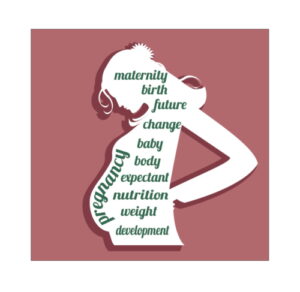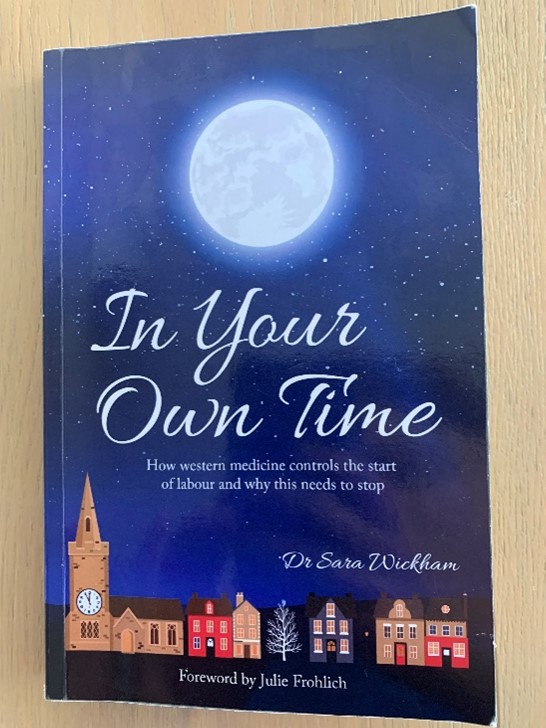Book Review- ‘In Your own Time’, ‘How western medicine controls the start of labour and how this needs to stop’, by Dr Sara Wickham.
I was first introduced to this book during my doula training. I was instantly drawn to learn more, as its title really spoke to me. I had felt the pressures of the western maternity system when I was pregnant and awaiting the birth of my first baby.
‘In your own time’ a phrase which has been said to us all when we were children perhaps, learning a new skill or as a young adult embarking on new horizons. How important it is to reassure women that this next phase of life for you should happen in your own time, just like all the other rites of passage that you have experienced.
Dr Sara Wickham begins by explaining the benefits of waiting for labour to begin spontaneously, and of the waiting period or ‘zwischen’.
Wickham writes anecdotally to explain the benefits of waiting and then uses research and evidence to back up what she, herself has witnessed of women. She shares some beautiful stories of women in labour and writes with such admiration for the families in her care.
I learned how social scientists describe the modern approach to childbirth as the ‘technocratic paradigm’… I was totally stumped too! However, she explains in a very clear way the rationale behind maternity practices which have come to be routine. She explains modern society views pregnancy and childbirth as ‘risky business.’
There is a lot of research quoted in this book, which I like, as it outlines the trials carried out and gives you the facts and figures in a relative way. Wickham teaches you how to read and interpret research which is invaluable to women preparing to give birth in a hospital setting. There is real life stories of midwives and mother’s experience of induction, which is very helpful to read, and is a nice break from the statistics.

She discusses the benefits to mother and baby in waiting for spontaneous labour to begin. She introduces us to other researchers and doctors who explore the idea that we should look at the long-term effects of induction to both mother and baby, not just of stillbirth outcomes and the baby’s physical wellbeing at the time of birth. Wickham shows us that the modern maternity care model doesn’t take this approach, disempowering women to make decisions which will benefit them and their family in the long term.
Dr Wickham strives to give a balanced view and ensures not to come across that she is anti-induction. She gives examples and evidence as to when induction is suitable and necessary for some women.
The author discusses the routine tests and procedures we have during pregnancy, the validity and accuracy of them and how those results can lead many care teams to suggest induction. One example is due dates. I really love how Dr Wickham speaks as a midwife and a researcher advising her patients to plan something nice for your estimated due date as there’s a 95% chance your baby isn’t coming that day!
Explaining the history of due dates to the reader, how they came to be, that due dates are completely man made and are just culturally accepted as ‘a thing’ in pregnancy is really powerful. She explains how ultrasound machines and other professionals can decide your due date without taking your own knowledge into account, which again doubts the woman. Due dates are one of the first things decided on at the very beginning of your pregnancy, but the impact this estimated due date can have at the end of your pregnancy in those waiting days when you’re in your in between phase, can be so very stressful on a woman. The pressure to be induced if your ‘post-dates’ can be immense.
Wickham writes that ‘normality is a range’, and that the length of pregnancy for each woman is different and can depend on many factors, which she explores.
I really admire how the author is always championing women and instilling confidence and belief in ourselves. This is the underlying tone of the whole book. She’s putting the power back into our hands.
Not only is this book evidence-based, but there is lots of humour in this book too – she is a very witty lady.

Dr Wickham discusses the complicated argument for induction in late pregnancy. She gives the reader all of the evidence and the rationale behind offering induction, which is so helpful for anyone faced with an induction towards the end of pregnancy. She discusses too, the actual risks of stillbirth and gives us the figures so as to explain the evidence more comprehensively.
In later chapters Wickham goes on to discuss the validity for inducing suspected big babies, centiles, averages and normality, and how ‘Offering an ultrasound in late pregnancy to estimate or assess the baby’s size is also not supported by evidence’. She speaks to midwives who relay of instances where women were induced for concerns about the baby’s weight and or size and when the baby was born, they were not to be considered as anything other than average.
In chapter 7 entitled ‘Too old, too fat, too black, too risky?’ Dr Wickham explores how certain groups of women are treated in western maternity settings and how the care of minority ethnic backgrounds, older women and larger women may be given different maternity treatment because of implied advice in recent maternity guidelines. She speaks about the dangers in implying interventions from maternity policy makers for the above-mentioned groups of women. Once it becomes the cultural norm it is very difficult for those women to be seen as individuals and have a voice.
To end Dr Wickham discusses how induction is an epidemic and how evident this has been during the COVID-19 pandemic where in the UK the induction rate was 34% which is one in three women, and other high-income countries had a similar if not higher incidence. (Harkness et al 2021)
She goes on to discuss solutions that aren’t helping, and how to overcome this epidemic.
She concludes by once again reminding us of how powerful we are as women, that we are descendants of thousands of generations of women who have successfully given birth. She instils belief and encouragement in the reader, reminding us that we are just as capable of growing, birthing and feeding our babies in today’s today.
Recently, my friend had been recommended an induction by her maternity care team. She asked me for some advice, as she had been overwhelmed by the information she had received in hospital and that was on the internet. I gave her this book to decide for herself what she wanted to do. She was so thankful for the clarity it gave her to make a decision without fear or persuasion. This is when this book served its exact purpose. I believe it can and will do the same for countless other women faced with the decision of having an induction.
To purchase this book, CLICK HERE
I’m Cleo Leydon, a doula at the Doula Training Academy. I live in the northern suburbs of Perth and have a special interest in postpartum care.
Contact me using any of the links below.
Business Name:
A Mama Nua
Business email:
[email protected]
Phone number:
0426 452 105
Instagram:
https://www.instagram.com/a.mama.nua/
Website:
www.amamanua.com (coming soon)

